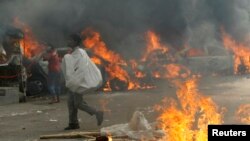NEW DELHI —
In Bangladesh, at least three people have been killed in protests which erupted after the execution of an opposition leader convicted of war crimes. The execution of 65-year-old Abdul Qader Mollah has raised fears of deepening strife in a country already coping with violent opposition-led protests ahead of elections next month.
Warnings by the Jamaat-e-Islami party of “dire consequences” if its former leader was hanged began to play out within hours of the execution of Mollah.
He was executed Thursday night after the Supreme Court rejected his appeal for a review. A controversial war crimes tribunal had found him guilty of aiding Pakistani troops in killing hundreds of civilians and other crimes during Bangladesh's 1971 war of independence. His funeral took place in his home town of Faridpur early Friday.
Jamaat activists torched homes and businesses, blockaded roads, set fire to vehicles and attacked ruling party supporters in outlying towns and districts. Police say two Awami League supporters were hacked to death and one person died in clashes between police and protestors.
Security has been beefed up in the capital Dhaka as the situation remains volatile.
A Dhaka resident, Mohammad Khokan, described an incident. He said the protesters came with boxes full of bombs and they wore helmets and started throwing handmade bombs on the street and ran away.
Abdul Qader Mollah was the first of the five Islamist leaders who have been sentenced to death by the war crimes tribunal to be hanged. The convictions in connection with Bangladesh's liberation struggle more than four decades ago have prompted protests and counter protests.
Many secular activists support the trials. Following the execution they held celebrations in the capital Dhaka and broke into cheers saying justice has been served.
But the opposition says the tribunal was set up by the ruling party to eliminate opposition leaders.
The controversial trials have deepened divisions between the main opposition party, an ally of the Jamaat-e-Islami, and the ruling party, which are already at loggerheads over the holding of elections next month.
A professor of politics at Dhaka University, Ataur Rahman, says the political divide could jeopardize the polls.
“It would be very difficult or well nigh impossible to hold elections in this kind of civil strife," Rahman said. "This government unfortunately could not make any sort of political accommodation with the (opposition) political parties so far. In terms of political reconciliation it could not succeed, it does not have any good record of political conflict resolution so far.”
At least 100 people have died in violent protests in Bangladesh since October, but observers fear there could be more violence in the coming weeks.
Warnings by the Jamaat-e-Islami party of “dire consequences” if its former leader was hanged began to play out within hours of the execution of Mollah.
He was executed Thursday night after the Supreme Court rejected his appeal for a review. A controversial war crimes tribunal had found him guilty of aiding Pakistani troops in killing hundreds of civilians and other crimes during Bangladesh's 1971 war of independence. His funeral took place in his home town of Faridpur early Friday.
Jamaat activists torched homes and businesses, blockaded roads, set fire to vehicles and attacked ruling party supporters in outlying towns and districts. Police say two Awami League supporters were hacked to death and one person died in clashes between police and protestors.
Security has been beefed up in the capital Dhaka as the situation remains volatile.
A Dhaka resident, Mohammad Khokan, described an incident. He said the protesters came with boxes full of bombs and they wore helmets and started throwing handmade bombs on the street and ran away.
Abdul Qader Mollah was the first of the five Islamist leaders who have been sentenced to death by the war crimes tribunal to be hanged. The convictions in connection with Bangladesh's liberation struggle more than four decades ago have prompted protests and counter protests.
Many secular activists support the trials. Following the execution they held celebrations in the capital Dhaka and broke into cheers saying justice has been served.
But the opposition says the tribunal was set up by the ruling party to eliminate opposition leaders.
The controversial trials have deepened divisions between the main opposition party, an ally of the Jamaat-e-Islami, and the ruling party, which are already at loggerheads over the holding of elections next month.
A professor of politics at Dhaka University, Ataur Rahman, says the political divide could jeopardize the polls.
“It would be very difficult or well nigh impossible to hold elections in this kind of civil strife," Rahman said. "This government unfortunately could not make any sort of political accommodation with the (opposition) political parties so far. In terms of political reconciliation it could not succeed, it does not have any good record of political conflict resolution so far.”
At least 100 people have died in violent protests in Bangladesh since October, but observers fear there could be more violence in the coming weeks.









